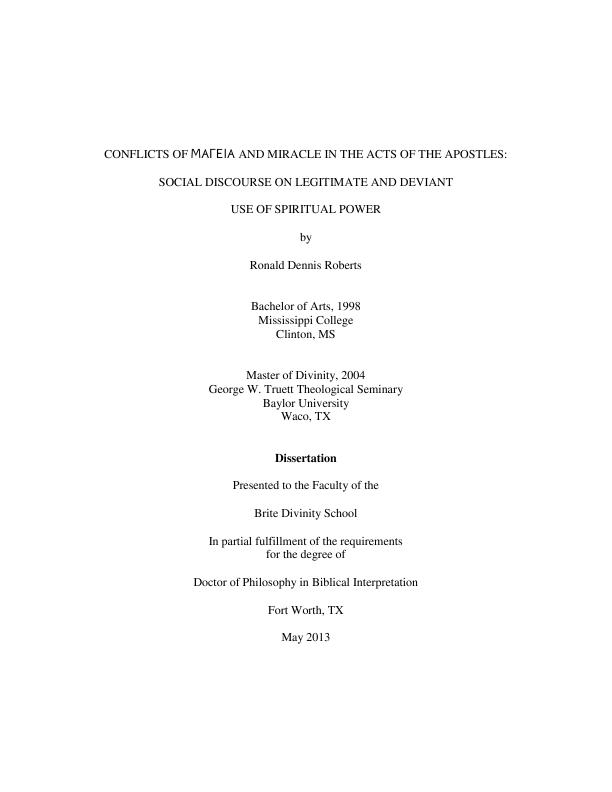Conflicts of mageia and miracle in the Acts of the Apostles: Social discourse on legitimate and deviant use of spiritual powerShow full item record
| Title | Conflicts of mageia and miracle in the Acts of the Apostles: Social discourse on legitimate and deviant use of spiritual power |
|---|---|
| Author | Roberts, Ronald Dennis |
| Date | 2013 |
| Genre | Dissertation |
| Degree | Doctor of Philosophy |
| Abstract | Most previous treatments of the four mageia-miracle conflicts in Acts (8:4-25; 13:4-12; 16:16-18; 19:8-20) do not adequately account for the socially constructed nature of the Greco-Roman concept of mageia and also fail to make an adequate distinction between modern Western concepts of magic and the ancient Greco-Roman concept of mageia. Employing a social-scientific-critical method, this dissertation engages in a narrative-focused analysis of these four texts and other relevant texts from Acts to understand better the socio-cultural elements in Acts' presentation of both miracle-working characters and their rival wonder-working characters, whom Acts primarily presents as popular magoi. My social-scientific-critical approach primarily depends upon the historical theory of Kimberly Stratton, the theories of the social-scientific study of magic, and the social-scientific study of social deviance (particularly the symbolic interactionist approach to deviance). For Greco-Roman Gentile readers in the regions stretching form Achaia to Asia Minor during the late first to early second centuries, the competitions between miracle-workers and popular magoi in the four mageia-miracle conflicts in Acts would function as more than mere warnings against the syncretizing of the Christ-movement with mageia or the recounting of historical tales of popular magoi who competed against the early Christ-following missionaries; instead, these four episodes contribute significantly to Acts development of a social identity for the relatively undefined social role of Christ-following miracle-worker. This miracle-worker social identity would not only function as a means of countering accusations of popular mageia directed at the Christ-movement but might also serve as a means by which a Christ-following reader of Acts may distinguish between legitimate wonder-workers (that is, miracle-workers) and illegitimate wonder-workers (that is, popular magoi). |
| Link | https://repository.tcu.edu/handle/116099117/4492 |
| Department | Brite Divinity School |
| Advisor | Carter, Warren |
Files in this item
This item appears in the following Collection(s)
- Doctoral Dissertations [1526]
© TCU Library 2015 | Contact Special Collections |
HTML Sitemap



